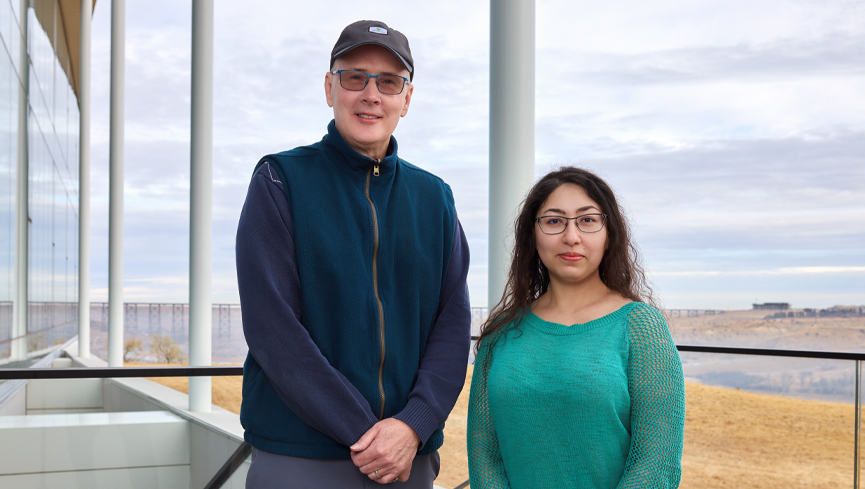Neuroscientists at the Canadian Centre for Behavioural Neuroscience (CCBN) at the University of Lethbridge have gotten one step closer to a definitive answer in their research with mice.
Their study, Effects of cannabidiol (CBD) treatment on age-related cognitive decline in C57 mice, published in Frontiers in Aging Neuroscience, has shown some promising results for certain types of cognitive functioning.

“There’s a lot of work to be done, but we’re very encouraged with this result,” says Dr. Rob McDonald, CCBN neuroscience professor and principal investigator on the study. “We need more studies; there are so many parameters that need to be worked out. And then, even when we get something that we’re very confident in, you have to go to humans and do double blind, randomized studies.”
Normal aging is associated with some cognitive decline, unlike Alzheimer’s disease where memory becomes increasingly impaired and cognitive abilities are lost. Lead researcher, Dr. Behroo Mirza Agha (BSc ’16, MSc ’18, PhD ’23), a postdoctoral fellow, and her team investigated the effects of CBD in the normal aging process of mice.
The research team took a group of ordinary mice and divided them into two groups when they reached 14 months of age (roughly equivalent to a human in their mid to late 40s). One group of mice received a daily dose (equivalent to a moderate amount) of CBD derived from Cannabis sativa obtained from ULethbridge biology professor Dr. Igor Kovalchuk’s lab. The control group received no CBD. The treatment continued daily for seven months.
Then both groups of mice were tested on several measures of functioning, including their ability to recognize a new object, walk on a balance beam, find a hidden platform in a pool of opaque water and remember in which of two environments they received a mild shock. These measures provided an indication of their object memory, motor function, emotional memory, spatial navigation and memory, which are linked to different networks in the brain, including ones centred on the perirhinal cortex, motor cortex, hippocampus and the amygdala.
“In the novel recognition task, both groups performed well; they could recognize the novel object,” says Mirza Agha. “However, when we did a one-month retention test, the mice in the CBD group could recognize the novel object, but mice in the control group didn’t.”
In the spatial navigation water task, both groups were slow to find the hidden platform in the pool during their seven training days. However, on the eighth day the CBD group found the platform faster than the control group. And when the platform was removed, the CBD group spent more time in the area where the platform had been located.
Both groups of mice performed equally well on the balance beam test, as well as remembering in which environment the shock was delivered and preferring the safe environment.
Researchers examined the brains of the mice for markers of inflammation, and they found the CBD group had less inflammation in the hippocampus, a central brain region crucial for spatial navigation and memory which has been shown to functionally deteriorate in aging and Alzheimer’s disease.
“Another take-home message from our study was that consumption of CBD for that long did not appear to have any negative effect on any of our animals,” says Mirza Agha. “However, it is important to note that not all potential effects were assessed like changes to internal organs and immune systems.”
The results clearly show that CBD improved long-term retention in the novel object recognition test and that it improved spatial memory consolidation. But does this mean that middle-aged people should start taking CBD? The researchers advise caution.
“This animal study doesn’t mean that now everybody should take CBD,” says Mirza Agha. “While it’s widely available, legal and affordable, we are now looking at its therapeutic potential and whether it’s safe to use widely as a medicine or not. Just because our study showed there were no clear negative effects of taking CBD on sensory, motor, motivational and cognitive functions at that dose doesn’t necessarily mean that everybody should take it. I think it needs to be supervised by a medical professional, and we need more research into the long-term effects of daily usage on both the brain and body.”
